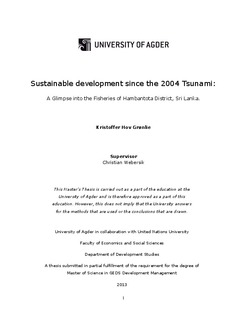| dc.contributor.author | Grønlie, Kristoffer Hov | |
| dc.date.accessioned | 2013-10-09T11:25:13Z | |
| dc.date.issued | 2013 | |
| dc.identifier.uri | http://hdl.handle.net/11250/135285 | |
| dc.description | Master thesis in development management - University of Agder 2013 | no_NO |
| dc.description.abstract | Fish is an important source of protein for many of the world’s population. For fish resources to be renewable marine aquatic ecosystems must be protected. This view is not held by all of those directly involved in fisheries. How those involved in fisheries are aware of and work in relation to notions of the importance of conservation of natural resources plays a role in illustrating how sustainable the fishery they work in actually is. The case of Hambantota district fisheries in Sri Lanka was chosen to investigate
this element of sustainable relations between humans and natural resources.
This research has acquired information from several men working in fisheries of Hambantota district, in the form of interviews, conversations and observations. The men were asked a number of questions
relating to fishing and their awareness of the importance of environmental conservation and sustainable development. Information illustrating the pressures faced by these men directing them away from
sustainable fishing practices was also acquired in the interviews. What was found was that the fisheries of Hambantota district were not suffering any substantial losses in
fish yet, but that increases in fishing competition as well as many using illegal fishing methods has slowly the amount of fish caught per boat, according to many interviewers. Further, inflation and lagging wages were motivating fishery employees to catch ever more fish. With no immediate sign of improvement it was not unlikely that they would continue to want to further increase catches in order to maintain making
living wages. These trends seem to point to the less-than sustainable growth and development of Hambantota fisheries.
While not currently facing any substantial aquatic resource drops overall it seems that it is moving in that direction. Since many of those involved in fishing do not seem all that aware of the importance of
conservation it can be assumed that this unsustainable development may in part be blamed on the collective unawareness of the importance of aquatic resource conservation. Recommendations focus on
increasing the awareness of the importance of aquatic resource conservation, while also enforcing regulations that are already in place. | no_NO |
| dc.language.iso | eng | no_NO |
| dc.publisher | Universitetet i Agder ; University of Agder | no_NO |
| dc.subject.classification | UT 503 | |
| dc.title | Sustainable development since the 2004 tsunami : a glimse into the fisheries of Hambantota district, Sri Lanka | no_NO |
| dc.type | Master thesis | no_NO |
| dc.subject.nsi | VDP::Agriculture and fishery disciplines: 900::Fisheries science: 920 | no_NO |
| dc.subject.nsi | VDP::Social science: 200::Economics: 210 | no_NO |
| dc.description.embargo | 2018-07-01 | |
| dc.source.pagenumber | 59 p. | no_NO |
